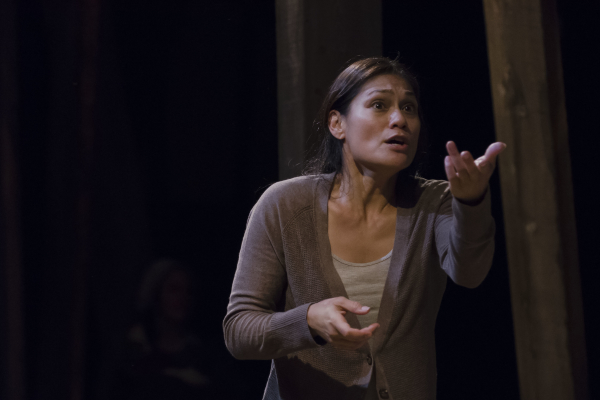Reconsidering Hanna(h)

(© Kalman Zabarsky)
Playwright Deirdre Girard has dramatized the 1697 kidnapping of the Puritan woman Hannah Dustin by a Native American raiding party in Reconsidering Hanna(h), based on a historic event that has been largely forgotten. Dustin's ordeal was reshaped by legend over the centuries and manipulated to serve various purposes. Now running at Boston Playwrights' Theatre, Girard's play probes whether Dustin was a heroine for surviving her abduction, or a wanton killer for murdering 10 of her captors and taking their scalps before she escaped.
Like Tom Stoppard's Arcadia, Reconsidering Hanna(h) tells its story through the theatrical convention of time travel, pairing the 17th-century woman with a 21st-century journalist, named Hanna, who is dealing with violent impulses of her own. However, as if probing the ancient murders and the plight of women then and now were not enough, Girard has piled on a series of contemporary issues. And that's not to mention the anguish of the modern Hanna, a recent widow.
The action, loosely related, turns on Hanna, a reporter just back from Afghanistan, where her mission included helping women and children displaced by the war. Shortly after she returned, her husband, also a journalist, was shot and killed by members of the drug cartel he was investigating. To assuage Hanna's grief, her editor, Matt, assigns her a piece about Hannah Dustin, who is back in the news. A politically correct group in Haverhill wants to remove her bronze image because of her bloody deeds, even though this public statue was the first monument erected to a woman in America. Hanna needs to get inside the head of her 17th-century namesake to discern her motives before she can write the article, to decide for herself if Dustin was guilty or merely trying to protect her reputation before her homecoming.
Celeste Oliva is double-cast as both Hannah and Hanna, which means tearing off a 17th-century shift and jacket to reveal the 21st-century clothing (and back again) as the scenes alternate between the two periods. Oliva, a competent actress, relies chiefly on anger to fuel the action but also flails with guilt as the modern Hanna. In contrast, she plays the historical Hannah as clear-eyed, if agitated by her acts. The supporting cast includes Kippy Goldfarb as Mary Neff, Hannah's nurse, a self-effacing, religious woman, and Barlow Adamson and Caroline Lawton as Hanna's two modern-day friends, Matt, the gay man who seems to be a mouthpiece for morality, and Joanna, a researcher at the newspaper with complex ties to Hanna. Adamson and Lawton do the best they can with these underwritten characters.
Director Bridget Kathleen O'Leary has staged the two halves of the play on an expanded playing space, allowing the short scenes to jump between pre-Colonial America and present day. O'Leary makes time into a parallel rather than chronological phenomenon by leaving Mary at the side of the stage to watch and listen when the play returns to present day — a nice touch. Scenic designer, Anthony Phelps, has built a forest out of vertical, rough-hewn wooden beams to suggest leaning trees. Costume designer Rachel Paula Shufelt contributed a shift-like gown with jacket for Hannah that is pulled over Hanna's tight T-shirt and pants for the quick changes.
Only occasionally does the dialogue refer to the American national policy of disregarding the rights of the Native American — and worse — but these passing mentions aren't enough to sustain it. If there's a cogent drama buried in Reconsidering Hanna(h), it's been hidden beneath a heap of coincidence, confrontation, and remorse.










